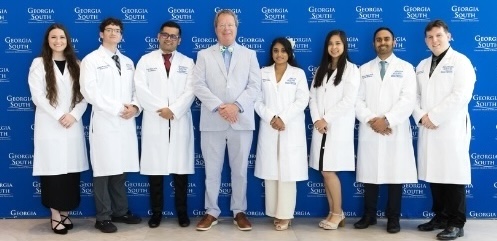‘Humbling experience’: Students help deaf children in Jamaica
Published 1:51 pm Thursday, February 16, 2017

- Contributed photoFrom left, Sam Dindoffer, Jeremy Ashton (HATponics), Cal Paige, Brandon Poag, Darryn Pasqua, Meghan Higgins, Anna Verhoeff, Emily Holmes (HATponics), Ryan Cox (HATponics), David McVicker, Evan Acres and Veljko Stojanovic stand proudly in front of the completed aquaponics unit in Jamaica.
DALTON, Ga. — Brandon Poag said he didn’t expect to literally dig out the side of a mountain in Jamaica, but that’s what happened.
“We got over there and actually saw it was a steep mountain so that was pretty tough,” said Poag, a senior at Christan Heritage School.
Poag, juniors Sam Dindoffer and Meghan Higgins and seniors Evan Acres, Cal Paige, Darryn Pasqua and Veljko Stojanovic traveled to Jamaica in December to help build a hybrid energy system for the Jamaican Christian School for the Deaf in St. James. The school needed a reliable source of energy to power its aquaponics system. That system provides a sustainable source of food and income for the school and community.
“We were successful in accomplishing what we were trying to do,” Higgins said.
The students’ micro-hydroelectric turbine and solar panels harnessed the power of both sun and water.
“We were able to finish and have water flowing throughout the system within six days,” Paige said.
The team was there Dec. 7-15. The students partnered with HATponics in Rossville and Servant’s Heart Jamaica, a nonprofit organization based in Cleveland, Tenn.
“We worked with HATponics once before in Africa, it’s a lot of hands-on experience,” Pasqua said. “A Servant’s Heart was good also because we interacted with kids while working with more professionals.”
Pasqua said he enjoyed building solar panels and providing energy to the aquaponics system at the school.
David McVicker, upper school head at Christian Heritage who accompanied the students on the trip, said he is “extremely proud” of them.
“They worked so hard on the preparation leading up to the trip,” he said. “Everything done was student driven, they planned the entire build, designed everything and raised all of the funds necessary for us to travel.”
McVicker said the students gave their all.
“From digging out the side of a mountain to moving rocks all day long and setting up solar panels. All so there could be lasting benefits to these deaf children in Jamaica,” he said. “I couldn’t be more proud of the students.”
Anna Verhoeff, the aquaponics coordinator at Christian Heritage, said it was wonderful watching the students work.
“It was an amazing experience to watch them with the kids in Jamaica working for the deaf school. They really did a lot,” Verhoeff said.
Stojanovic said they were busy 90 percent of the trip.
“We were working and the rest was either sleeping or eating. The last day we toured and went to the beach. Everything was beautiful,” he said.
Paige said he noticed how thankful the locals were.
“They work really hard, a lot of people were grateful to help us with the project,” he said. “They showed us how to use certain tools and were a big help.”
Acres said it was a great trip.
“The kids were very friendly and liked being around us,” he said. “It was a very humbling experience getting to be around them and see what their lives are like in a foreign place.”
McVicker said it’s powerful for the students to go somewhere in the world and make a difference.
“As a teen, to know they can do something now that will have a meaningful impact in other people’s lives and last for a significant amount of time, is such a powerful message,” he said.
Higgins said it’s an experience she’ll never forget.
“We’re blessed with so much being able to come to this school (Christian Heritage) and use those opportunities and resources we have to go help them (the Jamaican Christian School for the Deaf),” she said. “It was really cool.”
McVicker hopes it’s a lesson the students will carry with them forever.
“When they graduate from our school and go to other places they know ‘I can do things that make a difference’ in other people’s lives, and hopefully they will continue to look for those activities when they are older,” he said.





